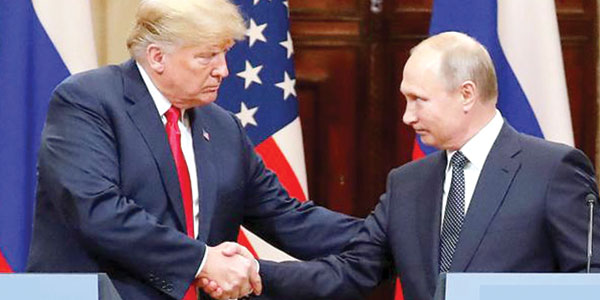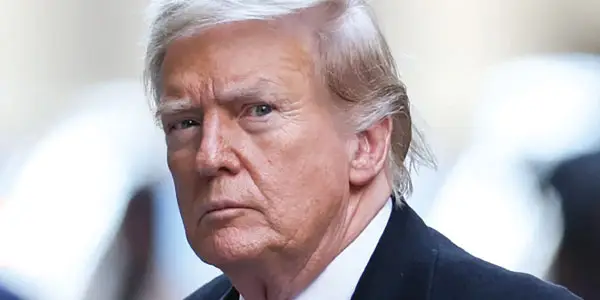
By Jorge Ramos
As we all know by now, the Russian government launched a cyberattack against the United States during the lead-up to the 2016 presidential election. Yet the assault was followed by neither a declaration of war nor a public confrontation between Presidents Donald Trump and Vladimir Putin. No nuclear attacks were threatened. Instead, Trump has seemed to do everything in his power to stay on good terms with the Russian leader.
More cyberattacks should be expected — during the 2020 election and beyond — from Russia and other countries. Hacking is now standard practice in our age of digital warfare.
Not all attacks are the same, of course. The events of Sept. 11, 2001, claimed the lives of nearly 3,000 Americans, led to two wars (in Afghanistan and Iraq) — the effects of which are still being felt today — and radically changed our way of life. Every day we take steps to prevent another such terrorist attack. Our response to cyberattacks, the power of which isn’t measured in human casualties, has been very different. We tolerate them and expect them to occur with some frequency. After all, who hasn’t been hacked, seen their computer infected by a virus or had their personal data stolen? Governments, like people, assume there’s no such thing as total privacy or security in the digital world.
One of the most important and damaging findings of special counsel Robert Mueller’s recent report is that the Russians interfered in the last U.S. presidential election specifically to benefit Trump and undermine his Democratic rival, Hillary Clinton. Through the St. Petersburg-based Internet Research Agency, the Kremlin conducted “a social media campaign designed to provoke and amplify political and social discord in the United States,” the report says. The Russian operation, which was started as early as 2014, continued to evolve and by 2016 “favored candidate Trump and disparaged candidate Clinton.”
What did the Russians do to achieve their goals? First, they bought “political advertisements on social media in the names of U.S. persons and entities.” Secondly, they “hacked into the Clinton campaign and distributed stolen material that was detrimental to it” through the GRU, Russia’s military intelligence agency. This agency “stole hundreds of thousands of documents” from the email accounts of Clinton’s campaign chairman, John Podesta, and other employees and volunteers. These documents were released through WikiLeaks and fake sites like DCLeaks. Finally, there were multiple contacts between the Russians and members of the Trump campaign.
Mueller’s report clearly states that “the investigation did not establish that members of the Trump campaign conspired or coordinated with the Russian government in its election interference activities.” But at the end of the day, Trump benefited from this interference.
To what extent? We’ll never know. There’s no way to quantify precisely how many extra votes Trump might have won or Clinton lost as a result of Russia’s meddling. How many tweets or Facebook posts do people have to read before they change their minds about a candidate? Perhaps nobody ever changes their mind, and we only use social media to reaffirm our thoughts and prejudices.
We live in a world riddled with fake news, where confusion is pandemic. A new theory suggests that, in the midst of such chaos, reporters use stories and narratives in a vain attempt to make sense of an ultimately inexplicable world. Rather than spin stories, the theorists suggest, journalists should focus on reporting data and trends.
One of the problems with Russia’s meddling in the 2016 election is that the story is simply too good, stocked as it is with captivating heroes and villains and unparalleled international espionage. The Russian government, for one, has denied the conclusions of the Mueller report and claims it never interfered in the election.
If we start from the premise that the primary goal of every government is its own survival, it follows that it will spy on, and initiate cyberattacks against, its enemies whenever it can. And one good hacker — whether based in Washington, Moscow, Caracas or Pyongyang — can threaten any government or multinational corporation anywhere in the world.
Russia’s crass intervention in the 2016 U.S. election was therefore just the front line in the latest global war — one that employs very different methods from the wars we’ve known in the past.
_________________________________________________________________________
La Guerra de los Hackers
“Hackear” es la nueva manera de hacer la guerra. Y los hackers son los nuevos soldados.
En 2016 Estados Unidos fue atacado, cibernéticamente, por los rusos. Pero eso no desembocó en una declaración de guerra, ni en una confrontación pública entre los presidentes Donald Trump y Vladimir Putin o en amenazas nucleares. Al contrario, Trump parece hacer todo lo posible para llevarse bien con el líder ruso. Y debemos esperar nuevos ataques, no sólo de Rusia, sino también de muchos otros países. Esa es la nueva normalidad.
Hay de ataques a ataques. Los del 11 de septiembre del 2001 cobraron la vida de casi 3.000 estadounidenses, provocaron dos guerras — Afganistán e Irak — que aún hoy arrastramos y cambiaron radicalmente nuestro estilo de vida. Todos los días hacemos cosas para que no haya otro atentado terrorista. Pero parece que los ataques cibernéticos — que no se cuentan en vidas humanas — son tolerables y esperados con cierta frecuencia.
¿Quién no ha sufrido un virus, un hackéo o un robo en su computadora? Los gobiernos, como las personas, asumen que no hay total privacidad ni seguridad en el mundo digital.
Una de las conclusiones más graves del reporte del fiscal especial, Robert Mueller, es que durante la pasada campaña presidencial los rusos interfirieron para beneficiar a Trump y para perjudicar a la candidata demócrata, Hillary Clinton. A través del Internet Research Agency, una agencia ubicada en San Petersburgo, los rusos realizaron “una campaña de redes sociales diseñada para provocar y amplificar las disputas políticas y sociales en Estados Unidos”. La operación rusa, iniciada en el 2014, evolucionó y para el 2016 “favoreció al candidato Trump y atacó a la candidata Clinton”.
¿Qué hicieron los rusos para lograr sus objetivos? Primero, “compraron publicidad política en redes sociales en nombre de personas u organizaciones de Estados Unidos”. Segundo, “el gobierno ruso hackeó y distribuyó material robado que perjudicaba a la campaña de [Hillary] Clinton” a través de una agencia de inteligencia conocida como GRU. Esto incluye el robo de “cientos de miles de documentos” de correos electrónicos de empleados, de voluntarios y del jefe de campaña, John Podesta. Esos documentos se dieron a conocer a través de WikiLeaks y de sitios ficticios como DCLeaks y Guccifer 2.0. Y tercero, hubo múltiples contactos de los rusos con miembros de la campaña de Trump.
El reporte claramente indica que “la investigación no estableció que miembros de la campaña de Trump conspiraron o coordinaron con el gobierno de Rusia sus actividades para interferir en la elección”. Pero Trump, al final de cuentas, salió beneficiado. ¿Cuánto? Imposible saberlo. No hay manera de obtener el número de votos extras que obtuvo Trump, o que perdió Clinton, gracias a la interferencia de los rusos. ¿Cuántos tuits o mensajes en Facebook e Instagram se necesitan para que una persona cambie de candidato? ¿O será que nadie cambia y sólo utilizamos las redes para corroborar nuestros pensamientos y prejuicios?
Vivimos en un planeta plagado de “fake news” y de confusión de contenidos. Hay una nueva teoría en el periodismo digital que sugiere que el mundo es caos, que los reporteros no podemos explicarlo y que, por lo tanto, nos inventamos historias o narrativas para darle sentido a cosas que no las tienen. Más que historias o cuentos, sugieren los nuevos teóricos, deberíamos concentrarnos en reportar datos y tendencias. El gobierno de Rusia negó las conclusiones del reporte Mueller y dice que no intervino en nada. El problema es que se trata de una historia perfectamente contada, con protagonistas y villanos, y con una inigualable trama de espionaje internacional. Lo que no sabemos, aunque lo suponemos, es el final.
Si partimos de la base que todo gobierno busca, antes que nada, su supervivencia, entonces va a espiar y ciberatacar a sus enemigos potenciales. Y basta un hacker con una computadora portátil en Portland, Moscú, Caracas o en Pyongyang para poner a la defensiva a cualquier gobierno o corporación multinacional.
La burda intervención rusa en las pasadas elecciones es sólo un adelanto. Hackear es la nueva guerra por otros medios.









